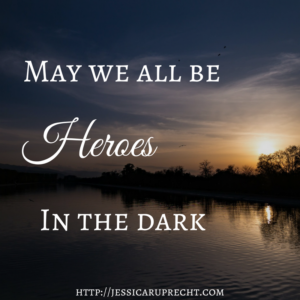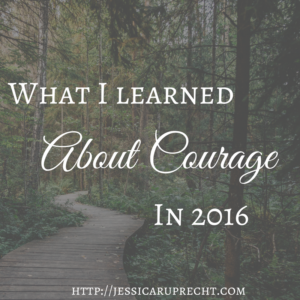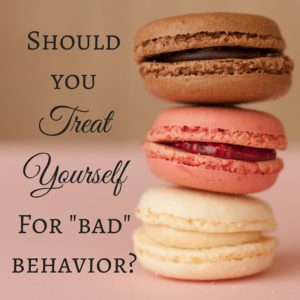 I’ve been struggling to find the right words since the election. I don’t want this blog to become a political forum, and yet I feel like the election is something that cannot go unaddressed — we cannot just pick up and go on with business as usual because what happened on November 9th means that business is no longer as usual.
I’ve been struggling to find the right words since the election. I don’t want this blog to become a political forum, and yet I feel like the election is something that cannot go unaddressed — we cannot just pick up and go on with business as usual because what happened on November 9th means that business is no longer as usual.
For many of us the election of Donald Trump as President of the United States was devastating. I count myself among that number.
As a candidate, Trump espoused a platform built on hatred and intolerance that I find difficult to stomach. At this point, it seems increasingly clear that he intends to carry at least parts of this agenda forward into the White House and I fear what this will mean for those of us who are most vulnerable: racial minorities, immigrants, women, LGBTQ+ people, and religious minorities.
I do not want to shut out all possibility for hope, because I think that hope is crucial. Hope is what encourages us to keep trying, to keep fighting, to pick ourselves up and keep pushing on. So I remain willing to be wrong — but from where I stand right now it seems not overly-dramatic to say that dark days and hard times lie ahead of us, and that the next four years will likely demand more of us than did the previous eight.
In the absence of a government working to protect our interests we, the individuals, will need to stand up for the rights we believe in more vocally and more visibly than we did before.
We will need to be braver, to be stronger, to be kinder, and more compassionate than we knew ourselves to be.
We will need to be ready to stand up for each other, to stand beside each other, and to fight together for the rights we believe in.
We will, each of us, be called upon to be heroes in the dark.
However it may seem from where you stand today, this isn’t a fight we’ve lost yet. This is a fight that’s only just beginning.
So with that in mind, here’s what wisdom I have for you in these dark times.
First and foremost, care for yourself and your safety.
I can’t know what lies ahead for any of us and I don’t want to be prematurely alarmist, because I know how easy it is for the mind to slip into catastrophizing and catastrophizing (in my experience) only makes us panic and panic leaves us ill-equipped to face the needs of the present moment.
However, I also don’t want to tell you that you shouldn’t be afraid, that you shouldn’t pay attention, that you shouldn’t take whatever precautions seem helpful — because I think you should. You should prepare yourself in whatever ways you can for the days to come.
Do what you have to do to keep yourself safe.
Listen to your fear — it’s trying to get your attention.
Your fear has one and only one agenda: to keep you safe.
However, problems arise when your fear cripples your ability to act in a misguided effort to keep you safe. I have a theory about why and how this happens: I believe that fear cripples us when we are unwilling to feel scared, when we are unwilling to engage with our fear where we stand.
It is this unwillingness to engage with our fear that paralyzes us and leaves us unable to act.
So what to do instead? Be willing to be scared, be willing to listen to your fear when it’s screaming for your attention. When I ask my fear what it needs from me, most often I find that my fear just wants me to know that danger is present — it wants to know that I’m paying attention so that if action is required, I’ll be ready to act appropriately to keep myself safe.
Don’t try to push past your fear, don’t try to ignore it, and don’t try to shove it aside into an unused corner of your mind. Trying to set your fear aside usually only makes it scream louder.
Instead, honor your fear and invite it to make the journey with you — you don’t have to be fearless in order to act with courage.
Practice reconnecting with a sense of calm
Here’s a truth I’ve grappled with in my own life: while the urgency of panic may seem productive or even helpful, the truth is that if you spend your whole life swept up in a state of anxious urgency you dull your ability to discern the difference between true, helpful fear and the false, panicky urgency that naturally creeps in around the edges of our overly-scheduled, busy lives.
Because of this, one of the most important things you can do is to develop a habit of checking in with yourself, noticing what emotions and physical sensations you are feeling in your body, and offering yourself and your feelings compassionate witness.
My morning meditation practice is something I’ve turned to for support in recent weeks. Meditation is just a drill for this more important daily habit of exercising awareness and mindful attention to ourselves and our emotions: I spend 20 focused minutes practicing so that I can build the muscle I need to carry this skill with me throughout the day.
Please note: I don’t believe that meditation is always right for everyone. I spent years trying to “make myself” meditate because I thought it would be good for me. And until recently, it wasn’t. I think you have to be ready to begin a meditation practice and not wanting to is generally a sign that you’re not ready. This is *especially true* for anyone dealing with unresolved trauma, as meditation can unlock old traumas and can be re-triggering and damaging if you’re not prepared. I’ve written more about this here (scroll down to the note at the end of the post for my thoughts on trauma).
Regardless of whether or not a meditation practice is the next right thing for you, cultivating habits that return you to a calm and peaceful sense of being grounded in yourself (this could be writing, a hot bath, going for a walk, making art, etc.) will be a crucial mental and emotional support for each of us in the years to come.
Don’t disdain the power of small actions
I’m so guilty of this, so I want to make sure to mention it. Please don’t disdain the power of small actions. I know how easy it can be to feel that as an individual you have so little power, so little ability to influence anything of significance, that you might as well not even try.
And from where I stand, this belief is a lie my fear-based thinking tries to sell me in order to convince me that I shouldn’t bother risking failure. For me, that’s what it’s really about: my ego hates to fail, my ego hates to lose — and so my ego would rather quit than the run the risk that I might try and not succeed.
Do what you can and let that be enough.
If all you can offer is five dollars or five minutes, then do that — and let that be enough. If you can offer more, that’s amazing — but don’t hold back because you feel that whatever you have to offer isn’t enough.
Don’t discount the power of small actions taken in aggregate. Do what you can, especially if your mind is trying to tell that a gesture so small must surely be meaningless.
It’s really, really not.
Take action in whatever way is right for you
In the days, months, and years to come there will be many people who want to tell you how you should take action. “Come march with me in Washington”, they’ll say. Or “Sign this petition!”. Or “Donate to my favorite charity!”. Or “Call your congressperson about X!”
Not all of these actions that other people will want you to take will be actions that are right for you.
I, for one, will not be participating in marches. I dislike crowds and loud noises and I find the energy of large, excitable, angry groups of people to be utterly draining and exhausting. It’s not a way of making my voice heard that is right for me — I’d much rather sit behind my computer and type words.
I love that people want to march to express themselves — to take a public stand for what they believe in. But I will not be joining them.
This is absolutely okay.
There are other ways I can contribute to this fight: I can donate money to organizations that will fight for our rights, I can sign petitions, I can call my congressional representatives, I can use my voice to speak about my beliefs with others, I can read the news and stay informed, I can bear witness.
Here’s another thing I can do: I can listen to people whose opinions differ from my own, I can challenge my own assumptions about people who are different from me, I can work to build bridges between people who have competing interests, belief systems, or priorities.
There is no one right way to fight injustice. There are always many paths to the same goal.
You don’t have to let other people pressure you into acting in a way that isn’t right way for you.
If you want to explore some different ideas about how we move forward from here, this post might be a good place to start.
Be patient, be kind, be gentle with yourself
This, perhaps more than anything else, is the most important thing I have to offer. The world right now is asking us to step up, to become braver than we have ever been.
This is not something that will be easy.
Over and over again I catch myself in the belief that not only should I be able to do hard things, but I should be able to do them easily, effortlessly, gracefully.
This is not true.
As a former ballet dancer, I know that the appearance of grace is always the result of thousands of hours of hard work and sweat. You have to put in the practice, you have to push against your own edges, before you finally master something new.
The same is true of courage.
If you’re not used to being brave, if you’ve spent your life feeling small, silenced, hidden, or afraid — don’t expect yourself to become someone different overnight.
It’s not going to be easy. It’s might be the hardest thing you’ve ever done.
So be patient, be kind, be gentle with yourself. You’ll get farther faster if you treat yourself with kindness and compassion than you will if you try to beat yourself into bravery with 10,000 judgemental sticks.
Courage is a muscle you build; it doesn’t happen overnight
Courage isn’t always something we’re born with. Courage is something we develop, it’s something we cultivate.
We grow our courage in the teeny-tiny steps, small acts of daring that slowly accumulate into the ability to move mountains.
Allow yourself to start small, to stretch your comfort zone out slowly. Don’t expect to be able to carry the world on your shoulders overnight.
But if you start small, if you build your courage slowly by taking actions that are just the tiniest bit outside your comfort zone and then the tiniest bit farther than that, your capacity to act bravely in the face of fear will grow and someday soon you’ll be brave enough to move a mountain.
And together we will need to move mountains.
Much love,
Jessica
 A year ago I decided that my word for the year in 2016 was going to be “DARE” (you can read more about that
A year ago I decided that my word for the year in 2016 was going to be “DARE” (you can read more about that  I’ve been struggling to find the right words since the election. I don’t want this blog to become a political forum, and yet I feel like the election is something that cannot go unaddressed — we cannot just pick up and go on with business as usual because what happened on November 9th means that business is no longer as usual.
I’ve been struggling to find the right words since the election. I don’t want this blog to become a political forum, and yet I feel like the election is something that cannot go unaddressed — we cannot just pick up and go on with business as usual because what happened on November 9th means that business is no longer as usual.